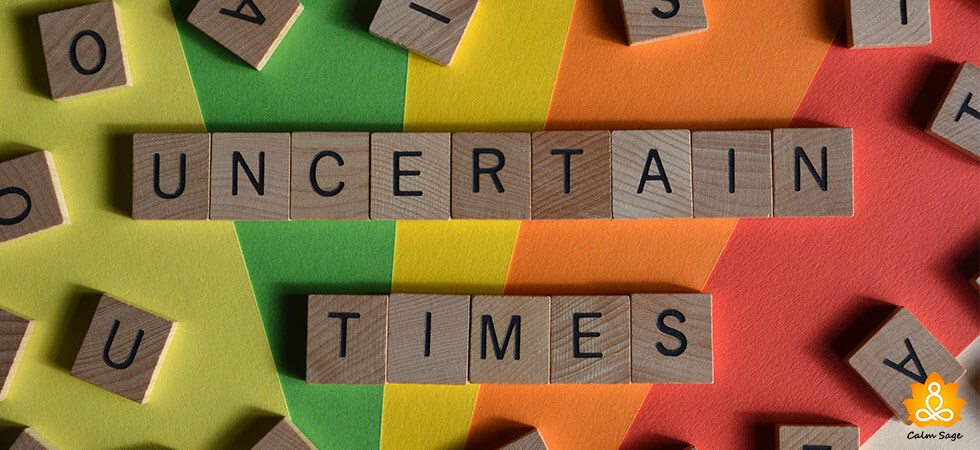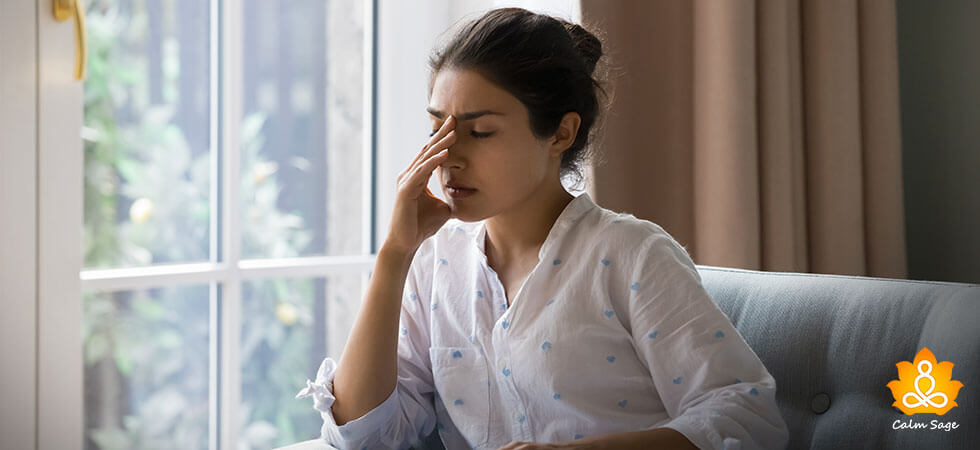7 Proven Ways to Cope with Uncertainty You Can Not Ignore Them

No one likes to deal with uncertainty. When things do not go how we planned them, we feel a loss of control and no one likes that. When this happens, it’s normal to feel anxious, nervous, and stressed.
Did you know that in a survey done by the APA, it was highlighted that one of the many reasons why people feel stressed is uncertainty? For almost 80% of people, uncertainty is one of the top reasons why they feel stressed.
And let’s face it, ever since the pandemic hit two years ago, every day brings a certain level of uncertainty with it. Of course, how well you cope with uncertainty also matters. If you have a higher tolerance for uncertainty, then you’re more resilient and less likely to experience low mood, negative thoughts, and anxiety.
Let’s look at some of the best ways you can cope with uncertainty in life and come out a more resilient and strong person in the end.
Uncertainty: The Cause Of Stress
When you welcome uncertainty in your life, it interferes with the ability to plan your future. Usually, your mind will make decisions for your future judging by your past experiences, however, when you are uncertain about your future or if you experience something new, then your mind can’t simply rely on past experiences to make an informed decision.
Without relying on your past experiences to make an informed decision, you become anxious about the future. Your mind conjures up many scenarios and you begin worrying about them.
We want to be prepared for whatever the future holds and without the knowledge of past experiences anticipating the future becomes more terrifying than hopeful. This uncertainty can cause the fear of the unknown and make us feel anxious about the future. The fear of the unknown can also trigger our stress, further activating the flight or fight response.
When this stress response is activated, your body might undergo physical changes such as increased heart rate, hormonal imbalance, memory loss, loss of control, etc. When this stress is left unaddressed, the risk of chronic stress increases.
When you’re constantly fighting uncertainty, you’re constantly fighting with your flight or fight response too. This pattern builds up to a chronic stress pattern, making you prone to anxiety, fear, and panic. Negative beliefs about uncertainty can also lead to unhealthy behaviors and emotional reactions.
High periods of uncertainty can also be linked to various mental health conditions including depression, generalized anxiety disorder, obsessive-compulsive disorder (OCD), and other related disorders. However, low periods of uncertainty can ensure low-stress levels and better overall health.
How To Cope With Uncertainty?
1. Create Plans, Not Expectations
Expectations – negative or positive – can lead to disappointments. You might have a scenario in mind and it’s OK but you can’t control the outcome of the said scenario. If you expect the best-case scenario, you’ll create an outcome in your mind that would be too hard to live up to, however, on the other hand, if you expect the worst-case scenario, you’ll create an outcome that will be too negative.
Expectations do not always come true so instead of expecting something specific, focus on creating a plan about what you want to happen. You can’t expect the right outcome all the time but you can create a plan to carry out those expectations.
2. Prepare For Everything
The hardest experience when it comes to coping with uncertainty is the loss of control. This experience is often accompanied by the inability to plan. I mean, you can’t plan for something that you have no control over, yet. However, what you can plan for are the many possibilities that you may encounter.
You can start by making a list of things you can control once you begin your initial journey. You can change this list according to what happens in the future. This step will ensure that you are prepared for everything and are not counting on only one experience.
3. Observe Your Feelings
What do you feel when uncertainty arises? How do you feel? For many, it’s not the idea of uncertainty that’s scary, it’s the idea of losing themselves in the feelings that uncertainty brings. The more you indulge your anxious feelings, the more you’ll experience unwanted thoughts. Once unwanted thoughts occur, it’ll be another cycle of nervousness and stress. More often than not, this will result in unhealthy coping mechanisms such as overeating, binge drinking, etc.
Here, you can stop this by observing your feelings and reminding yourself that while you can’t control the future, you can control the possibilities.
4. Be Confident
No, I’m not talking about always expecting the worst or preparing for the best. I’m talking about assuring yourself that you can tackle whatever comes your way. However, psychology professor, Julie K. Norem, explains that defensive pessimism can help people control their anxiety. Defense pessimism is when you consider the worst so you can plan how to tackle it.
Ask yourself, “What’s the worst thing that can happen to me?” Whatever your worst-case scenario is, know that you can handle it when the time comes. Do not be overconfident though. Make sure you remain confident in your ability to cope with the anxiety that uncertainty may bring.
Also Read: Want To Appear Confident? Here Are Body Language Tips To Help You Look Confident!
5. Deal With Stress First
When coping with uncertainty, you’re likely to deal with stress – in your body and mind – even if stress isn’t your first concern at the moment. Our bodies are made to handle small bouts of stress at a time but uncertainty can stretch those limits and cause negative impacts such as high blood pressure, low blood sugar, muscle tension, rapid heart rate, increased breathing, etc.
To cope with uncertainty, you need to practice stress management and relaxation techniques to not worsen your stress reaction. When you’re relaxed, you feel better prepared to deal with whatever life throws at you, uncertainty and all.
Also Read: 15 Best Stress Management Online Classes
6. Focus On What Is In Your Control
More often than not, you might overlook things you can engage in to make things easier for you and focus on what you can’t do. It’s human nature so it’s OK. However, you can change and adapt. For example, if you’re struggling with the uncertainty of moving to a new city, it’s normal to feel frustrated when you can’t find the right apartment or storage space.
But, in the same example, you can change your perspective and look at the situation a bit differently. Instead of focusing on what you can’t control (renting a long-term apartment), think about what you can control (renting a short-term space) until you feel comfortable with the situation.
7. Try Mindfulness
Tomorrow is something you can’t control or even predict but you can control your today and now. Instead of directing your mind to focus on the uncertainty of the future, allow it to appreciate the beauty of now. This can be easily achieved by practicing mindfulness or any exercise that helps you stay in the present moment.
Meditation is one of the best ways to incorporate mindfulness into your routine but it’s not the only way. Learn to practice mindfulness by journaling, reading, walking, connecting with your loved ones, or not doing anything. The idea is to focus on the present moment rather than worrying about the uncertain future.
Also Read: 50+ Daily Gratitude Journal Prompts That Will Change Your Life Forever
Wrap Up
Change is inevitable, no matter how hard you try to predict or control it. Uncertainty about the future can make you feel stressed but obsessing about something that hasn’t happened yet isn’t helpful. Embrace the present moment and the adventure life has to offer every day.
What tomorrow holds may not be easy but you can prepare yourself to tackle whatever comes your way. Instead of worrying about the outcome of the future, think about the many possibilities the future holds.
If you’re stressed and don’t know how to cope with uncertainty, you can connect with your loved ones. Social support can help a lot when it comes to coping with uncertainty. If that doesn’t work, you can always reach out for professional support. A therapist or counselor can help you come up with healthy coping techniques to cope with uncertainty.
I hope this article helped you understand how to cope with uncertainty. For more, you can write to us at info@calmsage.com or DM us on social media. You can also share your tips and tricks to cope with uncertainty in the comments below.
Take Care!





















DIY Jar is my favorite.